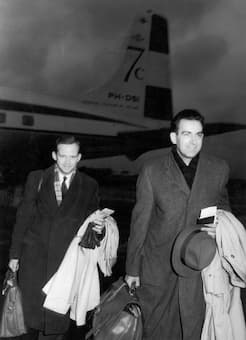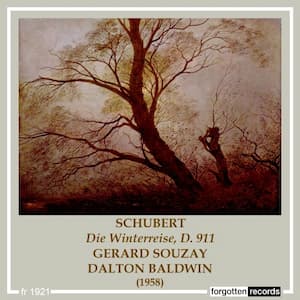
Wilhelm August Rieder: Franz Schubert
(1875 painting after an 1825 watercolour)
The song cycle enabled a composer to look at a subject from a variety of points of view. In the two song cycles by Franz Schubert (1797-1828), the first, Die schöne Müllerin (The Beautiful Miller’s Daughter), setting the poetry of Wilhelm Müller, we hear about the life and death of a journeyman miller. The work opens with an innocent optimism and by the end of the cycle, our miller-hero has died of a broken heart and his elegy is delivered by the brook along which he strode so confidently in the first song.
Schubert’s second cycle, Winterreise (Winter Journey), was published in 1828 and is another setting of the poetry of Wilhelm Müller. In 24 songs we follow a wanderer across a winter landscape. It’s not an easy journey – he arrives in a new town with a broken heart; everything around him reminds him of her and what he could have had. The tone of the poems and hence the songs, veers between a bitter humour and a depressed longing. The work is a kind of monodrama – the wanderer’s views become our views and the wanderer is, at best, highly subjective. The final song, where the wanderer questions the hurdy-gurdy player, can be considered the point at which either the wanderer wanders further, or we understand the instrumentalist to have been present all along and so the cycle must start again.

Dalton Baldwin (left) and Gérard Souzay (right)
on tour in Japan
In an essay by the tenor Ian Bostridge, he pointed out some of the ironies of the final song of the cycle. Der Leiermann refers to the player of the Drehleier, a stringed instrument where all the player has to do is turn a crank to sound the strings while pressing down on keys to play certain pitches. If we consider the lyre the instrument of Apollo and Orpheus, the instrument of gods and legendary musicians, the Drehleier and the Leiermann are on the other end of the scale. The instrument is vulgar and indecent and makes the player barely a musician at all. And yet our wanderer wants to throw in his lot with him.
The song opens with open fifths, signalling the use of the hurdy-gurdy. The melody he plays is strange and repetitive. Our wanderer notes that, as a musician, the hurdy-gurdy man is unsuccessful. His plate for donations lies empty on the snow in front of the barefoot musician. No one wants to hear his melodies or even look at him and even the dogs growl at him. The Leiermann doesn’t seem to care and stands in the cold and the wind, turning the crank on his instrument. The wanderer wonders if he should quit this town and accompany this man on his journey – the wanderer would sing as the Leiermann plays.
Franz Schubert: Die Winterreise, D. 911 (Gérard Souzay, baritone; Dalton Baldwin, piano)
This recording by French baritone Gérard Souzay (1918-2004) and American pianist Dalton Baldwin (1931-2019) was made in December 1958, recorded at EMI’s Abbey Road Studios. Souzay studied at the Paris Conservatoire, starting as a tenor and then finding his baritone voice. He started his concert career in 1945 with recitals and concerts and became known not only for his command of the French repertoire but also for German lieder. Starting in 1954, his accompanist was Dalton Baldwin; he retired from recitals in the late 1980s.
 Performed by
Performed by
Gérard Souzay
Dalton Baldwin
Recorded in 1958
Official Website
For more of the best in classical music, sign up to our E-Newsletter
